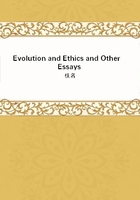
第29章
We are more than sufficiently familiar with modern pessimism, at least as a speculation; for I cannot call to mind that any of its present votaries have sealed their faith by assuming the rags and the bowl of the mendicant Bhikku, or the cloak and the wallet of the Cynic. The obstacles placed in the way of sturdy vagrancy by an unphilosophical police have, perhaps, proved too formidable for philosophical consistency. We also know modern speculative optimism, with its perfectibility of the species, reign of peace, and lion and lamb transformation scenes; but one does not hear so much of it as one did forty years ago; indeed, I imagine it is to be met with more commonly at the tables of the healthy and wealthy, than in the congregations of the wise. The majority of us, I apprehend, profess neither pessimism nor optimism. We hold that the world is neither so good, nor so bad, as it conceivably might be; and, as most of us have reason, now and again, to discover that it can be. Those who have failed to experience the joys that make life worth living are, probably, in as small a minority as those who have never known the griefs that rob existence of its savour and turn its richest fruits into mere dust and ashes.
Further, I think I do not err in assuming that, however diverse their views on philosophical and religious matters, most men are agreed that the proportion of good and evil in life may be very sensibly affected by human action. I never heard anybody doubt that the evil may be thus increased, or diminished; and it would seem to follow that good must be similarly susceptible of addition or subtraction. Finally, to my knowledge, nobody professes to doubt that, so far forth as we possess a power of bettering things, it is our paramount duty to use it and to train all our intellect and energy to this supreme service of our kind.
Hence the pressing interest of the question, to what extent modern progress in natural knowledge, and, more especially, the general outcome of that progress in the doctrine of evolution, is competent to help us in the great work of helping one another?
The propounders of what are called the "ethics of evolution," when the "evolution of ethics" would usually better express the object of their speculations, adduce a number of more or less interesting facts and more or less sound arguments in favour of the origin of the moral sentiments, in the same way as other natural phenomena, by a process of evolution. I have little doubt, for my own part, that they are on the right track; but as the immoral sentiments have no less been evolved, there is, so far, as much natural sanction for the one as the other. The thief and the murderer follow nature just as much as the philanthropist. Cosmic evolution may teach us how the good and the evil tendencies of man may have come about; but, in itself, it is incompetent to furnish any better reason why what we call good is preferable to what we call evil than we had before. Some day, I doubt not, we shall arrive at an understanding of the evolution of the Aesthetic faculty; but all the understanding in the world will neither increase nor diminish the force of the intuition that this is beautiful and that is ugly.
There is another fallacy which appears to me to pervade the so-called "ethics of evolution." It is the notion that because, on the whole, animals and plants have advanced in perfection of organization by means of the struggle for existence and the consequent "survival of the fittest;" therefore men in society, men as ethical beings, must look to the same process to help them towards perfection. I suspect that this fallacy has arisen out of the unfortunate ambiguity of the phrase "survival of the fittest." "Fittest" has a connotation of "best;" and about "best" there hangs a moral flavour. In cosmic nature, however, what is "fittest" depends upon the conditions. Long since , I ventured to point out that if our hemisphere were to cool again, the survival of the fittest might bring about, in the vegetable kingdom, a population of more and more stunted and humbler and humbler organisms, until the "fittest" that survived might be nothing but lichens, diatoms, and such microscopic organisms as those which give red snow its colour; while, if it became hotter, the pleasant valleys of the Thames and Isis might, be uninhabitable by any animated beings save those that flourish in a tropical jungle. They, as the fittest, the best adapted to the changed conditions, would survive.
Men in society are undoubtedly subject to the cosmic process. As among other animals, multiplication goes on without cessation, and involves severe competition for the means of support. The struggle for existence tends to eliminate those less fitted to adapt themselves to the circumstances of their existence. The strongest, the most self-assertive, tend to tread down the weaker. But the influence of the cosmic process on the evolution of society is the greater the more rudimentary its civilization. Social progress means a checking of the cosmic, process at every step and the substitution for it of another, which may be called the ethical process; the end of which is not the survival of those who may happen to be the fittest, in respect of the whole of the conditions which obtain, but of those who are ethically the best.